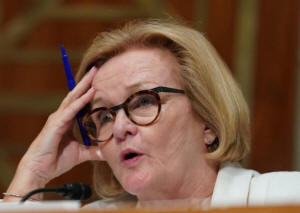|
Trump's Supreme Court pick tests
vulnerable Senate Democrats
 Send a link to a friend
Send a link to a friend
 [July 10, 2018]
By James Oliphant [July 10, 2018]
By James Oliphant
WASHINGTON (Reuters) - It may soon become
difficult to determine who sits in the hotter seat: U.S. President
Donald Trump's Supreme Court nominee Brett Kavanaugh or Senate Democrats
from conservative states who must decide whether they are jeopardizing
their political careers by opposing him.
Trump, a Republican, named Kavanaugh, a federal appeals court judge from
Washington, to the highest court on Monday, setting the stage for a
political fight that could consume the weeks before the congressional
elections in November.
Conservative advocacy groups are ready to pressure five moderate Senate
Democrats to support Kavanaugh, all of whom are up for reelection in
states that overwhelmingly backed Trump in his presidential run. They
argue that not doing so will damage the senators politically.
The Senate must confirm Trump's nominee by a majority vote. The
president's party holds 51 of 100 Senate seats, so liberal groups will
apply pressure on those same Democrats to hold firm against Kavanaugh
because the loss of only a Republican vote or two could sink the
nomination.
"They are stuck between a rock and a hard place," said Ford O'Connell, a
Republican strategist.

Three of those largely rural state Democrats, Joe Donnelly of Indiana,
Heidi Heitkamp of North Dakota, and Joe Manchin of West Virginia, voted
to confirm Trump's previous Supreme Court nominee, Neil Gorsuch, last
year. All three have touted their ability to work with Trump on various
issues.
The other two Democrats in so-called red states that lean Republican,
Claire McCaskill of Missouri and Jon Tester of Montana, are also at risk
of losing their seats.
"Obstructing confirmation will only backfire on vulnerable red-state
Democrats and show voters that all their talk of bipartisanship is
nothing but hot air," Katie Martin, communications director for the
National Republican Senatorial Committee, which backs Republican Senate
candidates, told Reuters.
To that end, the Judicial Crisis Network, which pushes for conservative
judicial nominees, will launch a $1.4 million ad campaign targeting
Donnelly, Heitkamp, and Manchin, according to a representative for the
group.
POLITICAL DYNAMIC
Americans for Prosperity, a conservative policy advocacy group backed by
the influential Koch network, has planned a seven-figure ad campaign to
support Kavanaugh, as it did last year on behalf of Gorsuch, as well as
mounting a grassroots campaign in Indiana, North Dakota, and West
Virginia.
[to top of second column]
|

Senate Homeland Security and Governmental Affairs Committee ranking
member Claire McCaskill (D-MO) questions Department of Homeland
Security Secretary Kirstjen Nielsen during a Senate Homeland
Security and Governmental Affairs Committee hearing on "Authorities
and Resources Needed to Protect and Secure the United States," on
Capitol Hill in Washington, DC, U.S., May 15, 2018. REUTERS/Erin
Schaff

Trump himself has been keenly aware of the political dynamic
involved. The White House invited on Monday several vulnerable
Democratic senators to the event naming Kavanaugh in order to place
maximum pressure on their vote. Each declined.
As a counterweight, a new liberal interest group, Demand Justice,
plans to spend as much as $5 million to push the moderate Democrats
to hold fast against the nominee, as well as attempt to persuade
moderate Republican senators Susan Collins of Maine and Lisa
Murkowski of Alaska to oppose Kavanaugh.
Democrats have another reason to worry about the impact of the
Supreme Court nomination, said Stuart Rothenberg, a non-partisan
political analyst in Washington. The red-state senators' support for
Kavanaugh could dampen the Democratic Party's anti-Trump enthusiasm
and, as a result, reduce voter turnout in the congressional
elections.
Still, Chris Kofinis, a Democratic strategist and former top aide to
Manchin, warned that Democratic leaders such as Senate Minority
Leader Chuck Schumer should not force at-risk Democrats to oppose
Kavanaugh if it isn't in their best interests. "They have to speak
for themselves," he said.
While Collins, Murkowski and Donnelly were non-committal on Monday
night, Manchin spoke up after Trump's pick was announced.
He said on Twitter he would decide whether to support Kavanaugh
based on whether the nominee would vote to invalidate sections of
the Affordable Care Act, which guarantees insurance coverage for
people with pre-existing medical conditions.

(Reporting by James Oliphant in WASHINGTON; Additional reporting by
Richard Cowan in WASHINGTON and Tim Reid in LOS ANGELES; Editing by
Damon Darlin and Paul Tait)
[© 2018 Thomson Reuters. All rights
reserved.]
Copyright 2018 Reuters. All rights reserved. This material may not be published,
broadcast, rewritten or redistributed.
Thompson Reuters is solely responsible for this content. |